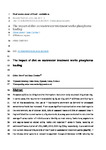The impact of diet on wastewater treatment works phosphorus loading

Date
2022-01-20Author
Subject
Metadata
Show full item recordAbstract
Phosphorus (P) is a building block for life in which the human body requires 0.55 g of per day. In some cases, this requirement is exceeded by 2 g per day, with P additives contributing to half of this exceedance. The use of P has become prominent as demand for processed convenience foods has increased. P can cause significant eutrophication once discharged to the environment. As of October 2019, 55% of assessed rivers and 73% of assessed lakes in England failed the current water quality standards. A survey was conducted to calculate the average P consumption of individuals who identify as meat eaters, flexitarians, vegetarians and vegans based on stated eating habits and reported P levels in foods, revealing an estimated P consumption of 1715, 1664, 1244, 1125 mg P/day respectively. It was estimated that current diets contribute 45% of the P load to UK wastewater treatment works (WwTW). If the UK population were to all convert to veganism this would decrease by 54% reducing the load to WwTW by over 15,000 tonnes of P per year, or 9000 tonnes of P per year if there was a move towards a 50% vegetarian or vegan population. Finally, the population needs to be better informed on what is in their food and the associated environmental impacts.
Publisher
Place of Publication
Journal
Volume
Issue
Pagination
Author URL
Recommended, similar items
The following license files are associated with this item:


